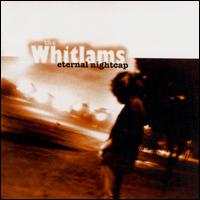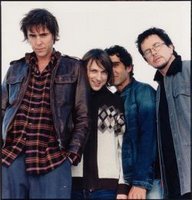MM Vol 1 - 114 - The Whitlams


MM Vol 1 #114
Whitlams
"No Aphrodisiac"
(1997)
.
.
.
Not many bands talanted as this, could survive so many horror stories as "The Whitlams" have had over the past few years and still carry on.
The Whitlams were formed in late 1992 when a former Penguin on Safari and a former Plunderer crossed paths at the annual independent music festival The Big Day Out . While missing Nirvana perform inside the arena, the two musicians lamented the local music scene and decided to form a musical alliance and The Whitlams were born. The initial band members were Tim Freedman, Stevie Plunder and Andy Lewis. Being without a drummer, the band developed their songs acoustically on Saturday afternoons at the Sandringham Hotel in King Street, Newtown (Sydney, Australia).
At the same time that the band was enjoying the success of their single "I Make Hamburgers" (1996) founding member Stevie Plunder was found dead on australia day, 1996, from what was believed to be an act of suicide. After a break of several months, Tim Freedman reformed the band with several new members, and they went on to record the album Eternal Nightcap. This album sold over 200,000 units and in 1998 won the band ARIA awards for Best Independent Album, Song of the Year and Best Group. This last award was presented by the band's namesake Gough Whitlam. "No Aphrodisiac", a single from this album, made it to number one in the 1997 Triple J Hottest 100.
Several of the band's songs were played during the 2000 Sydney Olympics as examples of Australian pop culture (for example, "Sydney 2000 Olympic Theme", a b-side from the "I Make Hamburgers" single that was reworked as "You Gotta Love This City" on Love This City -- an ironic choice, as the song's protagonist commits suicide by jumping in the Harbour at the end of the song, disgusted at the city's crass pursuit of money: It dawns on him / The horror / We got the Olympic Games).
During the band's Canadian tour in April 2000 supporting Blue Rodeo, the band received word that founding member, Andy Lewis, had committed suicide back in Australia. Andy had been battling gambling addiction for a long time prior to his death.
Blow Up The Pokies had been written by Tim as a statement on the destruction he saw in Andy's life due to his gambling not long before Andy's death, and was awaiting release as a single at the time. Tim soon after wrote The Curse Stops Here, a heartrending piece describing being the 'last one' from the original line-up of the band, and voicing his determination to survive. The Curse Stops Here was included as a B-side track on the Blow Up The Pokies single.
A month after Andy's death a benefit concert was held at the Metro club in Sydney to raise money for his wife and child.
At the same time that the band was enjoying the success of their single "I Make Hamburgers" (1996) founding member Stevie Plunder was found dead on australia day, 1996, from what was believed to be an act of suicide. After a break of several months, Tim Freedman reformed the band with several new members, and they went on to record the album Eternal Nightcap. This album sold over 200,000 units and in 1998 won the band ARIA awards for Best Independent Album, Song of the Year and Best Group. This last award was presented by the band's namesake Gough Whitlam. "No Aphrodisiac", a single from this album, made it to number one in the 1997 Triple J Hottest 100.
Several of the band's songs were played during the 2000 Sydney Olympics as examples of Australian pop culture (for example, "Sydney 2000 Olympic Theme", a b-side from the "I Make Hamburgers" single that was reworked as "You Gotta Love This City" on Love This City -- an ironic choice, as the song's protagonist commits suicide by jumping in the Harbour at the end of the song, disgusted at the city's crass pursuit of money: It dawns on him / The horror / We got the Olympic Games).
During the band's Canadian tour in April 2000 supporting Blue Rodeo, the band received word that founding member, Andy Lewis, had committed suicide back in Australia. Andy had been battling gambling addiction for a long time prior to his death.
Blow Up The Pokies had been written by Tim as a statement on the destruction he saw in Andy's life due to his gambling not long before Andy's death, and was awaiting release as a single at the time. Tim soon after wrote The Curse Stops Here, a heartrending piece describing being the 'last one' from the original line-up of the band, and voicing his determination to survive. The Curse Stops Here was included as a B-side track on the Blow Up The Pokies single.
A month after Andy's death a benefit concert was held at the Metro club in Sydney to raise money for his wife and child.
This song has a crowbarred rating of 92.5 out of 108
By The Year 1955 to 2005:
1955, 1956, 1957, 1958, 1959, 1960, 1961, 1962, 1963, 1964, 1965, 1966, 1967, 1968, 1969, 1970, 1971, 1972, 1973, 1974, 1975, 1976, 1977, 1978, 1979, 1980, 1981, 1982, 1983, 1984, 1985, 1986, 1987, 1988, 1989, 1990, 1991, 1992, 1993, 1994, 1995, 1996, 1997, 1998, 1999, 2000, 2001, 2002, 2003, 2004, 2005
Labels: Whitlams











0 Comments:
Post a Comment
<< Home